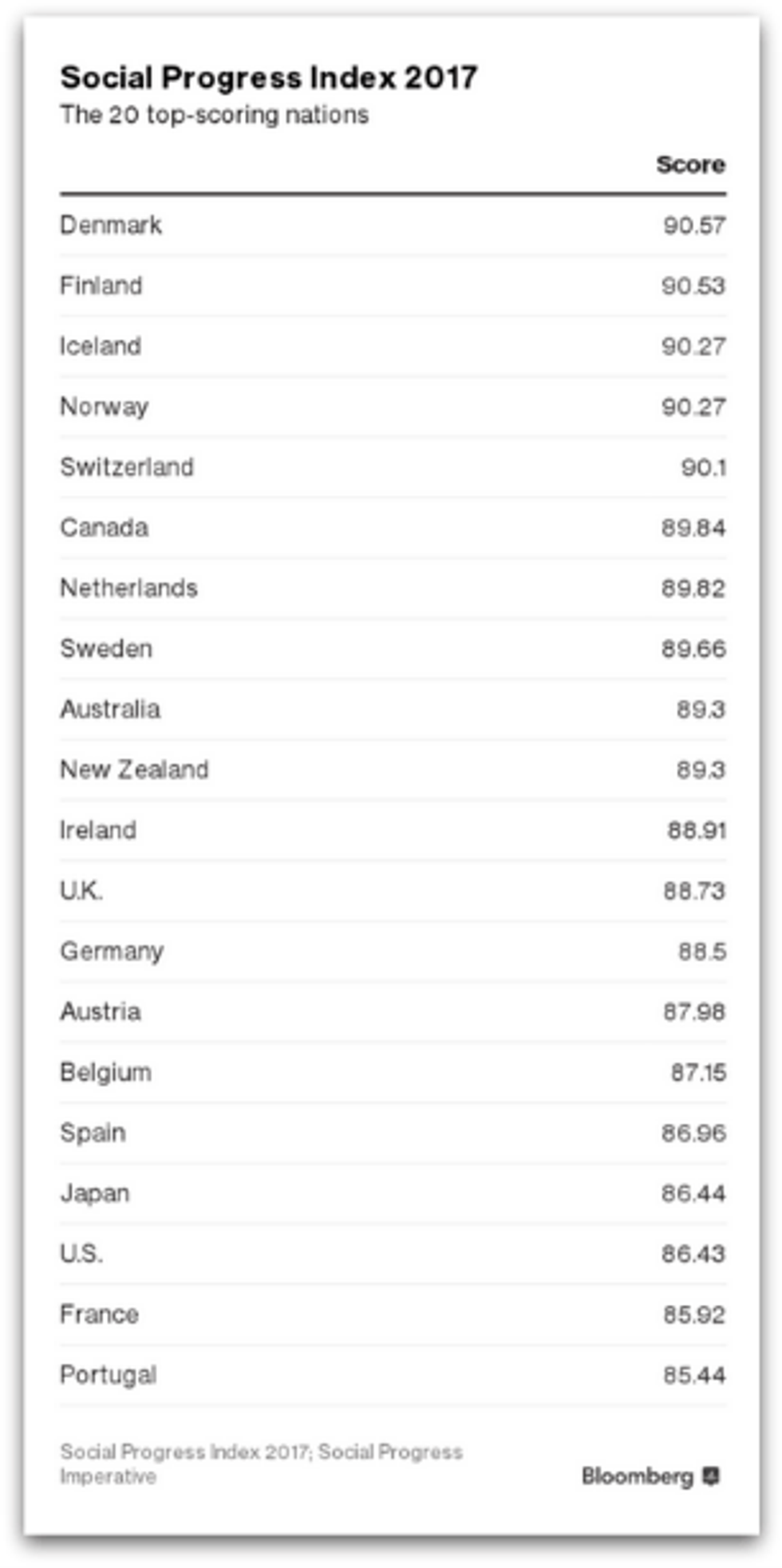

SUBSCRIBE TO OUR FREE NEWSLETTER
Daily news & progressive opinion—funded by the people, not the corporations—delivered straight to your inbox.
5
#000000
#FFFFFF
To donate by check, phone, or other method, see our More Ways to Give page.


Daily news & progressive opinion—funded by the people, not the corporations—delivered straight to your inbox.

The 2017 Global Social Progress Index reveals that the United States, the world's wealthiest and most powerful nation, ranks 17th in the world when it comes to promoting the general welfare for its people. (Photo: Pixabay/CC0)
Contrary to the mythological story known as "American Exceptionalism," the United States does a poor job, according to a fresh analysis, of meeting even "the basic human needs of its citizens" and should now be considered a "second tier" country in terms of promoting social progress.

Released by the Social Progressive Imperative (SPI), the 2017 Global Social Progress Index reveals that the U.S. ranks 17th in the world when it comes to promoting the general welfare, coming in behind its Canadian neighbor to the north and far behind Scandinavian countries and the other social democracies of Europe. Of all countries, Denmark comes in first when it comes to providing for its citizens and fostering progress on various fronts.
The Index, designed to offer "holistic" measurements of a country's social performance independent of broader economic factors. According to a snapshot, the analysis shows that between 2014--2017:
Michael Green, SPI's CEO, suggested that even as many of the world's least-developed nations continued to make strides, it was the backward slide and flat-lining of wealthy countries like the United States that should worry leaders in those countries.
"The US, the richest member of the G7 in terms of GDP per capita, is seriously underperforming to come in 18th in the world on social progress," Green said in a statement. "Lack of safety, school dropouts, and low life expectancy are part of the story but so too is a slump in performance on tolerance and inclusion since 2014."
As Bloomberg notes in its reporting, "The results of the group's annual survey, which ranks nations based on 50 metrics, call to mind other reviews of national well-being, such as the World Happiness Report released in March, which was led by Norway, Denmark, and Iceland, or September's Lancet study on sustainable development. In that one, Iceland, Singapore, Sweden, and the U.S. took spots 1, 2, 3, and 28--respectively."
The U.S. was put in the "second tier" of the report's overall ranking, Green explained to Bloomberg, for its failure "to address basic human needs, equip citizens to improve their quality of life, protect the environment, and provide opportunity for everyone to make personal choices and reach their full potential."
ANd Ben Schiller, writing for Fast Company, offers plenty of other reasons why the report might serve to humble those Americans who continue to claim the U.S. is unequivocally the greatest nation in the world.
"The U.S. consistently falls down on health and wellness indicators, and our relatively high levels of violence, including gun crime," he writes. "We rank 82nd for suicides, suggesting poor mental health, and 27th for life expectancy. Our overall health and wellness ranking puts us on par with Turkey, hardly a lofty honor."
Better luck next year.
Trump and Musk are on an unconstitutional rampage, aiming for virtually every corner of the federal government. These two right-wing billionaires are targeting nurses, scientists, teachers, daycare providers, judges, veterans, air traffic controllers, and nuclear safety inspectors. No one is safe. The food stamps program, Social Security, Medicare, and Medicaid are next. It’s an unprecedented disaster and a five-alarm fire, but there will be a reckoning. The people did not vote for this. The American people do not want this dystopian hellscape that hides behind claims of “efficiency.” Still, in reality, it is all a giveaway to corporate interests and the libertarian dreams of far-right oligarchs like Musk. Common Dreams is playing a vital role by reporting day and night on this orgy of corruption and greed, as well as what everyday people can do to organize and fight back. As a people-powered nonprofit news outlet, we cover issues the corporate media never will, but we can only continue with our readers’ support. |
Contrary to the mythological story known as "American Exceptionalism," the United States does a poor job, according to a fresh analysis, of meeting even "the basic human needs of its citizens" and should now be considered a "second tier" country in terms of promoting social progress.

Released by the Social Progressive Imperative (SPI), the 2017 Global Social Progress Index reveals that the U.S. ranks 17th in the world when it comes to promoting the general welfare, coming in behind its Canadian neighbor to the north and far behind Scandinavian countries and the other social democracies of Europe. Of all countries, Denmark comes in first when it comes to providing for its citizens and fostering progress on various fronts.
The Index, designed to offer "holistic" measurements of a country's social performance independent of broader economic factors. According to a snapshot, the analysis shows that between 2014--2017:
Michael Green, SPI's CEO, suggested that even as many of the world's least-developed nations continued to make strides, it was the backward slide and flat-lining of wealthy countries like the United States that should worry leaders in those countries.
"The US, the richest member of the G7 in terms of GDP per capita, is seriously underperforming to come in 18th in the world on social progress," Green said in a statement. "Lack of safety, school dropouts, and low life expectancy are part of the story but so too is a slump in performance on tolerance and inclusion since 2014."
As Bloomberg notes in its reporting, "The results of the group's annual survey, which ranks nations based on 50 metrics, call to mind other reviews of national well-being, such as the World Happiness Report released in March, which was led by Norway, Denmark, and Iceland, or September's Lancet study on sustainable development. In that one, Iceland, Singapore, Sweden, and the U.S. took spots 1, 2, 3, and 28--respectively."
The U.S. was put in the "second tier" of the report's overall ranking, Green explained to Bloomberg, for its failure "to address basic human needs, equip citizens to improve their quality of life, protect the environment, and provide opportunity for everyone to make personal choices and reach their full potential."
ANd Ben Schiller, writing for Fast Company, offers plenty of other reasons why the report might serve to humble those Americans who continue to claim the U.S. is unequivocally the greatest nation in the world.
"The U.S. consistently falls down on health and wellness indicators, and our relatively high levels of violence, including gun crime," he writes. "We rank 82nd for suicides, suggesting poor mental health, and 27th for life expectancy. Our overall health and wellness ranking puts us on par with Turkey, hardly a lofty honor."
Better luck next year.
Contrary to the mythological story known as "American Exceptionalism," the United States does a poor job, according to a fresh analysis, of meeting even "the basic human needs of its citizens" and should now be considered a "second tier" country in terms of promoting social progress.

Released by the Social Progressive Imperative (SPI), the 2017 Global Social Progress Index reveals that the U.S. ranks 17th in the world when it comes to promoting the general welfare, coming in behind its Canadian neighbor to the north and far behind Scandinavian countries and the other social democracies of Europe. Of all countries, Denmark comes in first when it comes to providing for its citizens and fostering progress on various fronts.
The Index, designed to offer "holistic" measurements of a country's social performance independent of broader economic factors. According to a snapshot, the analysis shows that between 2014--2017:
Michael Green, SPI's CEO, suggested that even as many of the world's least-developed nations continued to make strides, it was the backward slide and flat-lining of wealthy countries like the United States that should worry leaders in those countries.
"The US, the richest member of the G7 in terms of GDP per capita, is seriously underperforming to come in 18th in the world on social progress," Green said in a statement. "Lack of safety, school dropouts, and low life expectancy are part of the story but so too is a slump in performance on tolerance and inclusion since 2014."
As Bloomberg notes in its reporting, "The results of the group's annual survey, which ranks nations based on 50 metrics, call to mind other reviews of national well-being, such as the World Happiness Report released in March, which was led by Norway, Denmark, and Iceland, or September's Lancet study on sustainable development. In that one, Iceland, Singapore, Sweden, and the U.S. took spots 1, 2, 3, and 28--respectively."
The U.S. was put in the "second tier" of the report's overall ranking, Green explained to Bloomberg, for its failure "to address basic human needs, equip citizens to improve their quality of life, protect the environment, and provide opportunity for everyone to make personal choices and reach their full potential."
ANd Ben Schiller, writing for Fast Company, offers plenty of other reasons why the report might serve to humble those Americans who continue to claim the U.S. is unequivocally the greatest nation in the world.
"The U.S. consistently falls down on health and wellness indicators, and our relatively high levels of violence, including gun crime," he writes. "We rank 82nd for suicides, suggesting poor mental health, and 27th for life expectancy. Our overall health and wellness ranking puts us on par with Turkey, hardly a lofty honor."
Better luck next year.